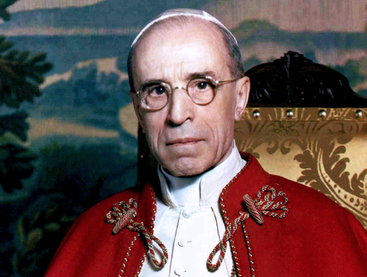The Supreme Pontiff speaks…
Pope Pius XII on the Obligation to Vote

In early September, we published a blog post on what traditional Catholic moral theology says about the obligation of voting, both in general and also in particular with regard to more difficult circumstances, such as voting when there are no ideal candidates on the ballot. The post can be accessed here:
Today we present excerpts from two allocutions given by His Holiness, Pope Pius XII (1939-58), in which he addresses the moral obligation to vote. The words of the Holy Father speak for themselves and will remain uncommented:
It is the right and at the same time the essential duty of the Church, to instruct the faithful in word and writing, from the pulpit or in the other customary forms, in regard to everything that concerns faith and morals or is irreconcilable with her own doctrine and therefore inadmissible for Catholics, be it a question of philosophical or religious systems, or of the ends intended by their fosterers, or of their moral conceptions concerning the life of either individuals or the community.
The exercise of the right to vote is an act of serious moral responsibility, at least when it is a question of electing those who are called to give the country its constitution and laws, particularly those concerning, for example, the sanctification of holidays of obligation, matrimony, the family, the school, and settlement according to justice and equity of the multifarious social conditions. It is therefore for the Church to explain to the faithful the moral duties which derive from the electoral right.
(Pope Pius XII, Allocution to the Sacred College of Cardinals, Mar. 16, 1946)
*** *** ***
It is a right and a duty to draw the attention of the faithful to the extraordinary importance of elections and the moral responsibility which rests on everyone who has the right to vote. Without any doubt, the Church intends to remain outside and above political parties, but how can she remain indifferent to the composition of a Parliament, when the Constitution gives it power to pass laws which so directly affect the highest religious interests and even the condition of life of the Church herself? Then there are also other arduous questions, above all the problems and economic struggles which closely touch the well-being of the people. In so far as they are of a temporal order (though in reality they also affect the moral order) Churchmen leave to others the care of pondering and treating technically with them for the common welfare of the nation. From all this it follows that:
It is a strict duty for all who have the right, men or women, to take part in the elections. Whoever abstains, especially out of cowardice, commits a grave sin, a mortal fault.
Everyone has to vote according to the dictates of his own conscience. Now, it is evident that the voice of this conscience imposes upon every sincere Catholic the duty of giving his or her vote to those candidates, or those lists of candidates, who really offer sufficient assurances for safeguarding the rights of God and the souls of men, for the real good of individuals, families, and society, according to the law of God and moral Christian doctrine.
(Pope Pius XII, Address to the Delegates of the International Conference on Emigration, Oct. 17, 1951)
The source for both of these excerpts is the book The Pope Speaks: The Teachings of Pope Pius XII, edited by Michael Chinigo (New York, NY: Pantheon Books, 1957), pp. 261 and 301.
There will be no combox for this post. The Holy Father has spoken; his words stand, and it is our obligation to assent to his teaching.

No comments:
Post a Comment